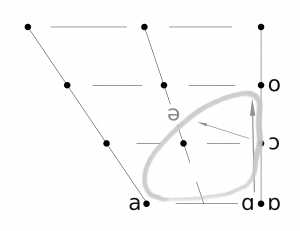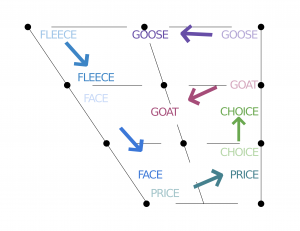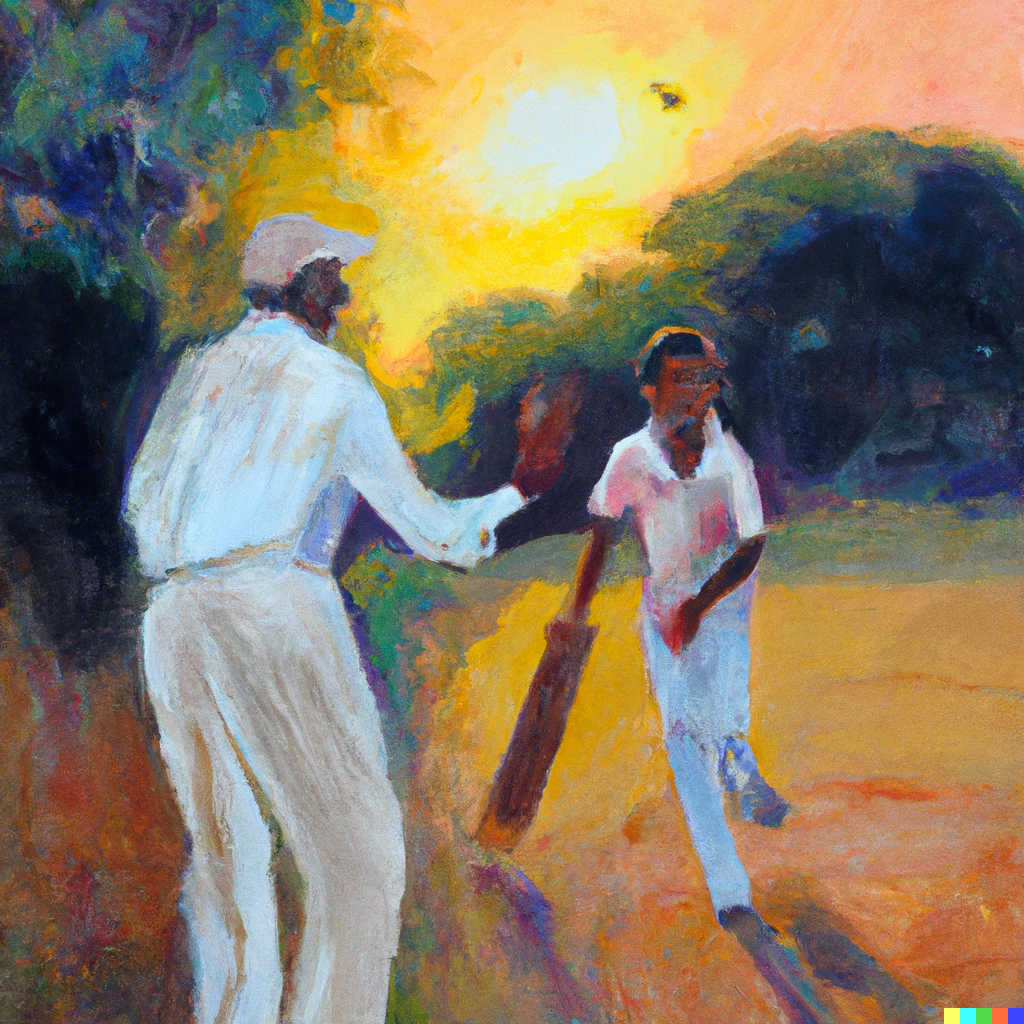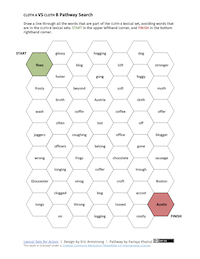12 The THOUGHT Lexical Set

The thought lexical set features words with the stressed vowel “aw,” or /ɔ/. The thought vowel is Free, so it can occur with no following consonant, and is always stressed in its dictionary form. The thought Lexical Set does not contain the words with this vowel followed by /r/; these words are in north and force.
thought is sometimes merged with the lot and/or palm Lexical Sets, as it is in some North American accents.
- 🕊Free: does not require a following consonant, and can exist on its own
- in stressed syllables and unstressed ones, too.
Spellings
Ⓐ auC, ough, aw, al, alk;
Ⓑ alC (other than /k/) – may merge with lot, depending on generation or region (sometimes known as the salt lexical set.)
The vast majority of words within the thought set are spelled with multiple letters, “au” before a consonant (C) as in “sauce,” or “augh, ough, aw, al, alk” as in taught, bought, jaw, wall, talk. Less common spellings include: Arkansas, dawn, awe, Sean, broad.
Pronunciations
The thought lexical set is pronounced with an open-mid back vowel, usually with at least some range of roundness. Frequently it’s [ɔ], with variations in the range of [ɒ~ɔ~o] in many of the mainstream accents of English. thought can merge with:
- lot, which is likely to be a bit more open/somewhat less rounded, and/or
- palm, which is unrounded, more open, and possibly more front, and/or
- cloth, which has no effect on pronunciation, but merely adds more words that can be spoken with the thought vowel.
Some accents have diphthongs for their pronunciations of thought, either one that becomes more rounded/close over time (e.g. [ɒo̯] which you might hear in the Southern US), or one that moves toward schwa, a centring diphthong, [ɔə̯], as you hear in some Cockney (in “free” syllables, with no following consonant), or New York City accents, where thought may merge with force.

For Englishes with a centralized goat vowel such as [əʊ̯ ~ əʉ̯ ~ ɛ̠ʉ̯], thought can move up into the range of [o], through a process known as a chain shift, where thought is moving “up” to fill in a gap left by goat’s forward movement. For example, in contemporary Standard British English, thought is now higher (more close) than it was in traditional Received Pronunciation, which was higher than old-fashioned RP (Lindsay, 2019).
Many second-language (L2) speakers of English either lack an equivalent [ɔ] vowel in their first-language (L1) vowel system, or they use it for /o/; in almost all of these cases, the tendency is for thought to merge with goat [o~ɔ]. L2 speakers may use spelling pronunciations for words with spellings other than ‹o›, especially in languages where spelling and pronunciation are more directly linked than in English.
Personal Pronunciation
Your personal pronunciation of thought is worthy of some exploration. But first, let’s see whether you have a merger with any of the possible candidates: cloth, lot, or palm. Note that many palm words may be distributed to other lexical sets in your particular accent. Compare your pronunciation of each column to see which vowels might match one another. Note that cloth will be merged with lot or thought, both, or even all three other sets!
| lot | cloth | thought | palm |
| bot | broth | brought | bra |
| cot | cost | caught | calm |
| jock | joss stick | jaw | Java |
| flock | froth | fought | father |
For more examples of each set, see lot, cloth, palm.

 Experiment on your own with an audio recorder, or with a classmate, friend, coach or teacher to identify how your thought compares with others’. Try extending the sound of your thought vowel, and then attempt to subtly shift it around in the vowel space—up, forwards, down, and back—in tiny increments. As it is a back vowel, as you experiment you should feel the top surface of the back of your tongue moving delicately up and down, towards/away from your soft palate and uvula, making more or less space in the back of your mouth. Also explore the degree of lip rounding you use with thought. Some pronunciations use a great deal of lip rounding, so much so that you may feel a kind of lip protrusion and a corresponding hollow cheek feel. Use a mirror to see if you round your lips at all, or to what degree you do it. Compare thought with goat, which is often quite rounded. Even if you don’t round your lips at all on thought, be sure to try all sorts of possibilities, from lots of rounding to none. Compare a thought word with lot, cloth, or palm[1] to see if you can feel a difference in the shape of the vowels. If you have a centring diphthong that moves towards schwa [ɔə̯], compare your pronunciation of thought with force/north. What’s the smallest noticeable change that you can make?
Experiment on your own with an audio recorder, or with a classmate, friend, coach or teacher to identify how your thought compares with others’. Try extending the sound of your thought vowel, and then attempt to subtly shift it around in the vowel space—up, forwards, down, and back—in tiny increments. As it is a back vowel, as you experiment you should feel the top surface of the back of your tongue moving delicately up and down, towards/away from your soft palate and uvula, making more or less space in the back of your mouth. Also explore the degree of lip rounding you use with thought. Some pronunciations use a great deal of lip rounding, so much so that you may feel a kind of lip protrusion and a corresponding hollow cheek feel. Use a mirror to see if you round your lips at all, or to what degree you do it. Compare thought with goat, which is often quite rounded. Even if you don’t round your lips at all on thought, be sure to try all sorts of possibilities, from lots of rounding to none. Compare a thought word with lot, cloth, or palm[1] to see if you can feel a difference in the shape of the vowels. If you have a centring diphthong that moves towards schwa [ɔə̯], compare your pronunciation of thought with force/north. What’s the smallest noticeable change that you can make?
Decide which vowel symbol best suits your thought Lexical Set. Is it [ɒ, ɑ, ɔ, o], or even [a], or a diphthong with [ɒo̯] or [ɔə̯]?
If your thought vowel is… (use whichever vowel symbol is appropriate for you)
- high, use the raised diacritic [ ɔ̝ ], a small T pointing up
- open, use the lowered diacritic [ ɔ̞ ], a small T pointing down
- pushed forward, use the advanced diacritic [ ɔ̟ ], a tiny plus sign +
- pulled back, use the retracted diacritic [ ɔ̠ ], a tiny minus sign –
- if you add lip-rounding, use the more rounded diacritic [ ɔ̹ ], a tiny ɔ, which represents the lips rounding/projecting forward (to the left),
- if you have no lip̤̤-rounding, especially on a symbol assumed to be rounded like [ɒ, ɔ, o], us the less rounded diacritic [ ɔ̜ ], a tiny c, which represents the lips relaxing/moving back (to the right).
Alternate Pronunciations
Experiment with the thought Word Lists, Phrases and Sentences with the following vowels:
As you move the vowels in the directions recommended, see whether that modified oral posture might inspire you to move the articulation of consonants and other vowels in the word in similar ways. Does it remind you of an accent other than your own?
Word Lists for thought, followed by a pause
KEY: ◾︎thought in stressed syllable ◽︎thought in unstressed syllable
Word Lists for thought, followed by a vowel
Many speakers with non-rhotic accents may introduce /ɹ/ after the thought vowel in this context, a so-called “intrusive” /r/.
Lists for thought, sorted by the consonant that follows
KEY: ◾︎thought in stressed syllable ◽︎thought in unstressed syllable
PLOSIVES
-p
-b
-t
-d
-k
-ɡ
AFFRICATES
-tʃ
-dʒ
NASALS
-m
-n
-ŋ
FRICATIVES
-θ
-ð
-f
-v
-s
-z
-ʃ
-ʒ
APPROXIMANTS
For thought followed by /-r/, see north and force.
thought before /l/ is split into two groups. thought Ⓐ features /l/ on its own, while thought Ⓑ, sometimes known as the salt Lexical Set, features thought before /lC/, as in halt, also, fault. For some speakers, especially in the North of England, and contemporary Standard British speakers, thought Ⓑ, is merged with lot. For more on this, see the salt-Split below, under Splits.
-ɹ
-l/ɫ
-w
Short Phrases
- Prawns in sauce
- An authentic, signed baseball
- The flawed chalk drawing
- Her daughter brought water
- Talk more audibly!
- In awe of Fall
- Installing an awning
- It’s all for naught
- They can’t “walk the walk”
- I caught Dawn yawning.
- Maude audited the author talk.
- A Shaw Festival audition.
- Launch the ball with caution.
- Put straw in the stall
- The debauched and naughty performer.

Sentences
Level 1
Short with 2-3 words, underlined
- My father-in-law is at the audiologist.
- I found the nautilus shell in the Caucasus mountains.
- Audubon would draw hawks expertly.
- Somerset Maugham’s The Hour Before Dawn.
- Paulina has autism and an auto-immune disease.
Level 2
Short with 4-5 words, underlined
- Is Shaw an awesome author or an appallingly awful eugenicist?
- Prime Minister Walter Nash brought TV broadcasting to Auckland, New Zealand.
- The audience loved the altercation between Andy Kaufman and Jerry Lawler on Letterman.
- Sean Combs and Lauryn Hill were authentically thoughtful.
- The gawky MalteseⒷ man balked at tasting the saltyⒷ sauce.
Level 3
Medium with 3-4 words, not underlined
- Shawna was awestruck by his authentic Pawnee artwork.
- Harmsworth Hall in Grand Falls in two-stories tall.
- Wasn’t his inauguration much smaller than he thought?
- Darth Maul ought to have caught them but his plan was flawed.
- The scarlet macaw squawked her raucous call.
Level 4
Hard with The 4-6 words, not underlined
- The fauns sauntered into their stall and pawed at the leafy stalks.
- We saw Sean on our trip from Galway to Donnegal.
- Tawny thought cole slaw ought to be cooked, not raw.
- Saucy Lord Falstaff flaunted his faults.
- She bought her Strawberry Shortcake doll at the mall in August.
Mergers
lot–thought Merger: Also known as the “cot-caught merger,” heard in Canada, Scotland, and a range of other accents in the US, including Northeastern New England, some regions of the South and West. This means that words like bobble/bauble, body/bawdy, chock/chalk, don/dawn, not/naught are pronounced similarly. If you have this merger, then try to differentiate the lot and thought words in this sentence; if you do not have it, try to match them! Experiment with lot/thought pairs such as [ɒ/ɔ, a/ɒ, ɑ/ɒ̝, ɔ/o, ɑ̟/ɔə̯ ]:
-
- Polly and Paul were awed by the odd fox named Faukes.
- As I was walked into the Honda Store, in Vaughan, I received a compliment on my watch.
- The unauthorized bank charges came from a popular restaurant that I have not gone to yet.
- Samantha taught her daughter to speak Tagalog at home, so her heritage is not forgotten.
The thought–cloth Merger is common in much of the US. When working on an accent with the lot–cloth Merger, learning to identify which words might shift to lot is fortunately fairly easy, as their “short-o” spellings generally makes them stand out from other thought words.
Those with a 3-way thought–lot–cloth Merger in your personal speech pattern, which happens in Canada and in parts of the West of the US, you’re going to have a particularly hard time decoding which words go where. And those with a 4-way thought–lot–cloth–palm Merger perhaps have it hardest of all! Be sure to tackle thought, lot, and palm before trying to make the following contrasts distinct.
cloth Ⓐ, Ⓑ Contrast Sentences with thought
- Merge all 3 with palm (and start, if non-rhotic) as in Canadian;
- Merge thought with Ⓐ, and lot with Ⓑ as in RP;
- Merge cloth Ⓐ and cloth Ⓑ with thought, while merging lotl with palmp as in GenAm.
- Saul didn’t wash the soft cloths with his laundry.
- The cost to install the hotl water softener in the office was appalling.
- Robl saw that frothing milk for coffee is notl easy.
- Shawn was appalled by the strong taste of guavap in the sauce.
- Tawny took off her uncomfortable brap and thong, and tossed them away.
thought–force(-north) Merger: In non-rhotic accents, force is frequently merged with thought. When force and north are merged, which is extremely common, they make a 3-way merger with thought. Examples of this merger can be heard in these homophones: draw/drawer, caulk/cork, caught/court, baud/board=bored, laud/lord, sawed/sword, pawn/porn, law/lore, flaw/floor. Do you pronounce these words in the same way? If so, your personal idiolect contains this merger. You’ll need to experiment with differentiating these Lexical Sets with the following thought/force–north pairings [ɔ/ɔə̯, ɒ/ɔə̯, ɑ/ɔɚ̯, ɒ/oɘ̯˞, ɒ/ɔ ]. If you don’t have the merger, explore making the double-underlined words match the single ones, trying out the following [ɑ, ɒ, ɔ, o].
-
- I saw that the poor dog’s paw was sore.
- The link between law and lore for Indigenous Australians has not always be caught by the courts.
- I thought my new Ford was flawed when the engine short circuited.
- We can’t afford to let down our audience, so we pre-recorded broadcasts before we left for holiday.
- Shay felt awkward as she walked alone through the orchid garden in Yorkshire.
thought–goat–north/force Merger: Heard in some northern accents of England, such as Bradford and Geordie, as well as in Northern Wales, this merger has goat spoken with the vowel of thought. As north/force are merged with thought in these regions already, it is really a four-way merger of thought–goat–north–force. Examples of thought–goat–north–force can be heard in these homophones: raw/roar/roe=row, yaw/yore=your/yo, law/lore/lo=low, Shaw/shore/show, talk/torque/toke, saw/sore/sew, paw/pore=poor/Poe, awe=aww/ore/owe=oh=O, gnaw/nore/no. If you have this merger, then explore making them different in this sentence with thought/goat pairs such as [ɑ/ʌʊ̯, ɒ/ɤʊ̯, ɔ/əʊ̯, o̞/əʉ ]; if you have some or all of them as distinct sets, try matching them throughout with any or all of these: [ ɑ, ɒ, ʌ̠, ɔ, ɤ, o ]. These sentences also include the north/force vowel.
-
- Oh, I’m in awe of the raw strength needed to row the boat over with the coal they called for and bought.
- Sophie secured an awesome course on the coast of Florida* to study sawfish.
- My boss cautioned me about emotional extortion.
- I can’t tune in to the launch of the new iPhone this morning.
Splits
salt Split: As we have seen, thought Ⓑ—sometimes known as the salt set—features words with ‹alC› or ‹aulC› such as false, vault, that split off from thought in parts of the UK. For speakers with the lot–salt merger, these words split away from thought to be merged with lot, even if the remainder of thought is distinct. Experiment with having the salts words below match with lot, and then with thought. Use lot/thought contrasts such as [ɒ/ɔ, a/ɒ, ɑ/ɒ̝, ɔ/o, ɑ̟/ɔə̯ ].
Althoughs the balds man forgot he dropped the ball, it was not his faults,
so he fought for a modest fall from grace.
Geordie ‹-al› Split: In the broad, working-class version of the Geordie or Tyneside accent from Newcastle-on-Tyne in the Northeast of England, thought is split. Words with the following spellings split away from thought, and take [a] (or, in other words, they merge with trap-bath).
- ‹-al› in those words with silent ‹l› before ‹k›: talk, walk, balk, chalk, stalk, staulk;
- ‹al-› stem words, such as also, almost, always, although, altogether, albeit;
- ‹-all› words, such as all, small, call, wall, mall, ball, hall, fall;
- those words already identified in thought Ⓑ, which is ‹alC›.
All other thought words in the Geordie accent are [ɔ].
Note that many contemporary, or middle-class speakers avoid this split as it is stigmatized; instead, they may have the salt split.
Review
Pathway Puzzles
 Pathway Puzzles allow you to practice finding members of a lexical set. Choose the next cell with the FIRST lexical set word to make a pathway from the START of the puzzle down to the FINISH. Open the KEY document to see the solution, and check your work. Pathway Puzzles were created by Farisya Khairul, through support from a AMPD Minor Research Grant.
Pathway Puzzles allow you to practice finding members of a lexical set. Choose the next cell with the FIRST lexical set word to make a pathway from the START of the puzzle down to the FINISH. Open the KEY document to see the solution, and check your work. Pathway Puzzles were created by Farisya Khairul, through support from a AMPD Minor Research Grant.
lot–thought Pathway Puzzle | KEY
A phonological change within an accent where a phoneme moves into the space vacated by another phoneme that has already moved. These can include multiple items as moving in concert. There are two sorts of "chain shifts", push shifts, and drag/pull shifts.
A pronunciation based on the spelling of the word rather than its traditional pronunciation. For L2 speakers, this may be associated with the spelling/pronunciation traditions of their L1 language.

